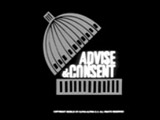
|
Advise & Consent (1962)
In this complex and controversial drama about party
politics with a big-name cast directed by Otto Preminger - it was
based upon Allan Drury's highly influential and best-selling, Pulitzer
Prize-winning political potboiler of 1959. It was both
praised for its daring homosexual subplot (taken directly from the
novel) and also condemned for its datedness. In one scene, it stereotypically
portrayed a NYC gay bar (Club 602) with the voice of Frank Sinatra
singing on the jukebox and the effeminate bartender beckoning for
a horrified homosexual character to enter:
- the plot was about the cancer-stricken US President's
(Franchot Tone) controversial and unpopular nomination of independent-minded
Robert A. Leffingwell (Henry Fonda) to the position of Secretary
of State. He sought the "advice" and "consent" of
the US Senate for confirmation. In the Senate, the President's appointment
was: supported by Senate Majority Leader Bob
Munson (Walter Pidgeon) from Michigan, and opposed
by southern Senator Seabright "Seab" Cooley
(Charles Laughton), who branded Leffingwell as an ex-left-wing,
former Communist Party member
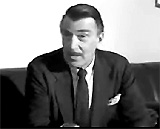
Senator Bob Munson (Walter Pidgeon) - Supportive of Leffingwell's
Nomination
|
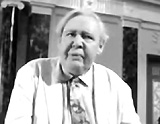
Dixiecrat Senator Seabright Cooley (Charles Laughton) - Opposed
to Leffingwell's Nomination
|
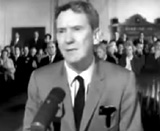
Herbert Gelman (Burgess Meredith) - Damaging Testimony
Against Leffingwell : "He's a Communist!"
|
- the head of the Senate nominating sub-committee to
gather testimony regarding Leffingwell's appointment was stringently-honest,
idealistic and principled Utah Senator Brigham Anderson (Don Murray).
When testifying under oath before the Senate subcommittee, Leffingwell
denied the "Communist" accusation from Sen. Cooley. However,
he was confronted by the testimony of a surprise witness - Treasury
Dept. clerk Herbert Gelman (Burgess Meredith), who openly declared:
"He's a Communist" - Gelman claimed that in the past in Chicago,
Leffingwell had participated in secret meetings and discussions within
a "Communist cell" using code names. He also claimed that
he had been a student in Leffingwell's class, and lost his job at the
Federal Power Agency where Leffingwell also worked at the time. Leffingwell
countered by claiming that Gelman was mentally-unstable, and was not
registered as one of his university students.
- in
fact, after the hearing, Leffingwell met privately with the President
who had appointed him, and admitted that he had lied, and asked to
have his name withdrawn: "I lied at the hearing.
I knew Herbert Gelman. I knew him in Chicago. I knew him at those
meetings. They were communist meetings, Mr. President. I was never
a party member, but I was young, looking for a cause. Didn't take
long to discover that wasn't it, and I dropped out." The President
refused - claiming it was only a 'youthful indiscretion.'
- then
it was revealed that Utah Senator Anderson also had a "nasty
secret" from
his own past. When Anderson returned home, he was asked by his wife
Ellen Anderson (Inga Swenson) about accusations that she had received
through anonymous telephone calls: "He
said that before you go on with the Leffingwell matter, you ought
to remember what happened in Hawaii...Then he hung up. What happened
in Hawaii, Brig?"
- Ellen asked her husband
about the caller who made it sound like he knew some kind of a "nasty
secret." He responded
by downplaying the "crackpot" calls and told her to hang
up on any future calls. Shortly later, Anderson received a call himself: "You'll
be interested in this. We have the stuff on Hawaii. If you don't
want us to use it, you'll get out of Leffingwell's way. This is no
joke, Senator. We'll use it...It's a photograph, Senator. And a letter."
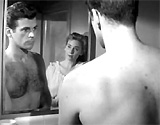
Senator Anderson Asked By His Wife Ellen: "What
happened in Hawaii?"
|
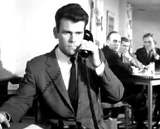
Anderson Receiving Threatening Phone Calls Himself
|
- the controversial candidate's
fate was ultimately in Senator Anderson's hands when he learned
of Leffingwell's perjury and demanded that his nomination be withdrawn:
("I'm giving you a chance. Call the press and announce your withdrawal").
However, Leffingwell refused and deferred to the President's opinion,
and Anderson was faced with making the truth public.
- meanwhile,
Anderson's threatening phone calls intensified from an "awful
creature" to coerce him to favorably confirm
Leffingwell, and his scared wife Ellen demanded to know more: ("They're
calling me, Brig. They're trying to force you to do something through
me. Now, you've got to tell me what it is"). He admitted he
had done something from his long-ago past, but wouldn't provide details:
("If I do what they want, everything that I have tried to be,
everything that I have tried to stand for in my life would be just
thrown away"). He tried to conceal the fact of his latent homosexuality
ever since, and it became an impediment in his attempt to have a
normalized marriage.
- in the film's most notorious
homophobic scene (including the first depiction of a gay bar in
a major Hollywood film), Sen. Anderson apparently feared that he
was going to be outed and wished to stop being harrassed. He tracked
down an overweight gigolo pimp named Manuel (Larry Tucker), who
directed him to NYC's Greenwich Village Club 602. As he entered
the bar, stereotypically depicted with gay males, Anderson heard
Frank Sinatra on the jukebox crooning: "Let
me hear a voice, a secret voice, a voice that will say. 'Come to
me and be what I need you to be'..." Sickened by the sight,
he frantically fled when Raymond Shaff (John Granger) approached
to apologize for the phone calls, and outside the bar admitted
he had sold his incriminating information (used as blackmail) for
money: ("I needed money, Brig. Well, you wouldn't see me.
I kept calling. I was drunk"). Ray was Anderson's former
Army buddy-lover with whom he had a month-long affair years earlier
during R&R in Hawaii. Outside the club, Anderson dashed for
a taxi, and pushed Ray into a gutter's mud puddle as he took off.
- Anderson was being blackmailed by ambitious, demogogic,
pro-peace, pro-Leffingwell freshman Senator Fred Van Ackerman (George
Grizzard) from Wyoming, who had dug up the dirt on Senator Anderson's
indiscretions from the past. A photograph of the two men (wearing
Hawaiian leis), and Brig's handwritten breakup letter sent to Ray
in 1952 were delivered to the Anderson home, revealing the
past to his wife
- unable to face reality, the
self-loathing Anderson returned to Washington DC and tragically
committed suicide - "In
his office, cut his throat" (slashed his own throat with a razor).
After her husband's death, Ellen was overwhelmed with grief: "He
was good, and kind and honest. I don't know what they were trying
to use against him, but whatever it was, they can't use it anymore.
So it doesn't matter, does it?"
- during
the final confirmation vote-process for Leffingwell, Sen. Munson
chided Ackerman Munson for his role in Brigham’s
death, and threatened censure and expulsion but then declined due
to respect for the Andersons' privacy: "We
tolerate about anything here. Prejudice, Atticism, demagoguery, anything.
That's what the Senate’s for,
to tolerate freedom. But you’ve dishonored us ....Fortunately,
our country always manages to survive patriots like you. We could
introduce a resolution to censure and expel you. But we don't want
Brig Anderson's tired old sin made public. Whatever it was."
- as it turned out, the climactic vote on Leffingwell's controversial confirmation
was contentious and basically deadlocked at 47 votes apiece. And then
it was announced that the President died, and the Vice President Harley
Hudson (Lew Ayres), the presiding officer in the Senate - and now the
new President-elect, announced that he would not confirm the appointment:
("The vice president will not exercise his constitutional privilege to break this tie
with an affirmative vote. The motion to advise and consent to the
nomination of Robert A. Leffingwell for secretary of state stands
defeated"). He preferred to appoint his own Secretary of State.
- the last lines of the film occurred as the Senate
was adjourned --- Munson: "Senators.
A great leader is dead. A bitter loss for our country. A bitter
personal loss for all of us here. I move we adjourn out of respect
until further notice."
Cooley: "So ordered."
|
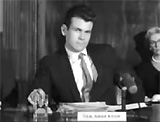
Senator Brigham "Brig" Anderson (Don Murray) - Head of Nominating Subcommittee
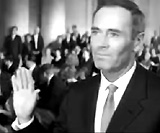
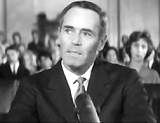
Robert A. Leffingwell (Henry Fonda) Testifying Before Sub-Committee
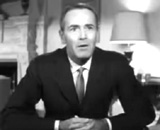
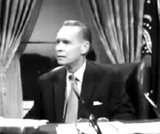
Leffingwell Admitting to the President That He Lied at the Hearing
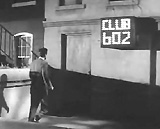
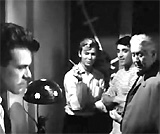
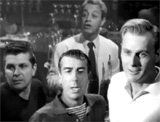

Sen. Anderson's Visit to Club 602
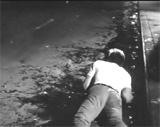
Ray Pushed Into Gutter Outside the Club
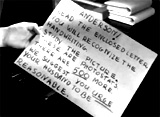
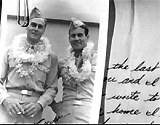
Threatening Blackmailing Photo and Letter About Sen. Anderson's Past Delivered
to His Home and Wife Ellen
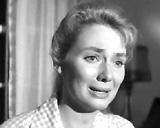
Ellen's Anguished Reaction to the Revelations
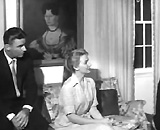
Ellen's Grief Over Her Husband's Death
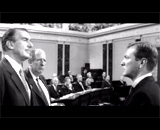
Sen. Munson Chided Ackerman For His Role in Anderson's Death
|
















